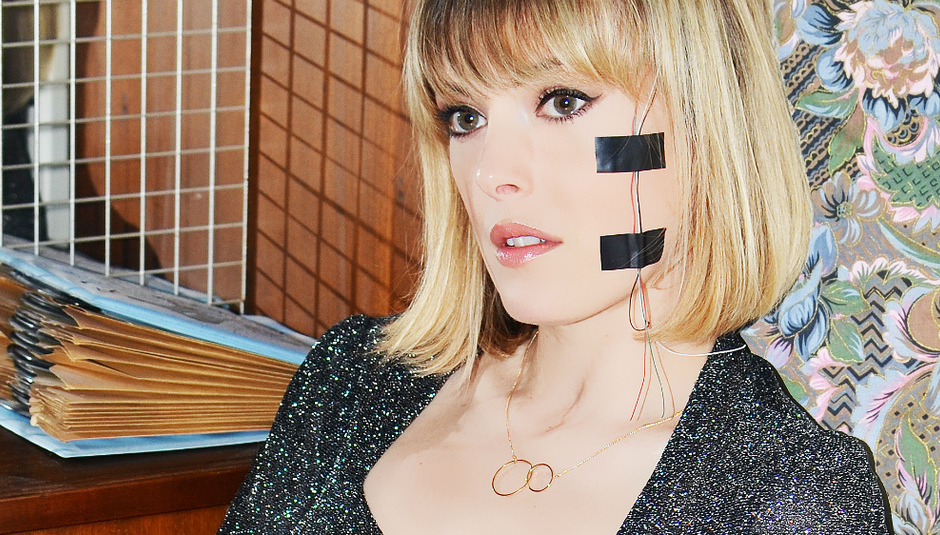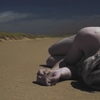Gwenno is a seasoned professional in the entertainment industry. She’s had stints in Vegas as a dancer for Michael Flately’s ‘Lord Of The Dance’, been a teen-rebel in a TV series in her native Wales and, most recently, a member of the indie-pop outfit The Pipettes. Gwenno has already achieved more than most… but within the guise of characters to some degree or other. So her debut solo album, Y Dydd Olaf (which translates as The Last Day and is taken from Owain Owain’s novel of the same name that inspired Gwenno’s writing) is performed in Welsh and Cornish, and removes the stage smile to reveal a hugely talented, brave, and thoughtful song-writer. Itself an exploration of utopian and hypothetical societies, the album oscillates with inter-planetary frequencies and has the gentle propulsion of Seventies kraturock.
But Y Dydd Olaf is also far more than planets of sound, it’s Gwenno’s manifesto and an intimate musing on life. She willingly provides answers to some of the questions she poses, while meditations fill the spaces where nothing can be offered. Exchanging words with Gwenno gives a surveying orbit of her musical planet and shines a light on an output that, while her most personal, exists within an atmosphere that’s far more fantastical than any of her past projects.
Album Stream
DrownedinSound: You returned to Cardiff several years ago, after travelling around for a significant part of your life. What did you see? How did it make you feel? What did you see in your native Cardiff that you’d noticed had changed or remained after your time away? How did that Cardiff influence Y Dydd Olaf?
Gwenno: If anything I think returning to Cardiff reminded me of a culture and people that was thriving and one that I hadn’t been exposed to in a very long time due to geographical reasons. That really had an impact on me. It was really exciting to reacquaint myself again with a culture that I hadn’t engaged with fully for years. The number of Welsh speakers has grown significantly in Cardiff over the past decade and that really gave me a lot of confidence, it made me feel less as if I’m in a minority - which I still obviously am as a Welsh speaker - and it felt like it was more dynamic somehow.
Interestingly, I think that social media really opened the door to that when I was still living in London as I’d come across a whole load of people who were living in Wales, both Welsh speakers and English speakers, who I found I shared a common interest and perspective with. It helped me to relate again to where I’m from and to the community of people who live there.
DiS: After your return home you decide to make a solo album. How did that then feel and how did you start to sonically put together the first incarnations of the album?
G: I’d been thinking and trying to work out what my next step would be after leaving The Pipettes for a really long time, it was a big process for me. Standing on my own two feet, artistically speaking, took me ages and there was a lot of soul searching.
I knew what ‘making an album’ meant to certain extent from my experience with the band, so that really helped from a practical point of view but imagining what the process would entail wasn’t something that I could do really. I suppose that I just put my head down and went about exploring sounds that I liked and recorded them as I went along. From that the album began to take shape.
I think the approach that I took which was a significant step forward for me was that I really honed in on the sounds that I would use to create a demo. The sounds were more important than the ‘song’ at first, that followed on a bit later once I’d collected noises and sounds that I really liked.
DiS: This album was also self-recorded, with some help from the label owner of Peski records Rhys Edwards, who originally put the album out on limited release. How was this process? What was it like stepping away from the framework of the traditional record label process and into the DIY model of operating?
G: I think that the most liberating thing for me has been setting the rules myself rather than fitting in with a set of rules that have already been made. Other people’s rules, artistically speaking, have been incredibly important to me over the years. I think theories and templates are essential when you’re creating any form of art, it gives you something to work against. I suppose that it took me up until the point of starting my new recordings to start working out what my own set of rules were.
Of course, when you’re setting your own rules it becomes uncharted territory for you, and don’t get me wrong, I’m influenced by everything I’ve ever heard and everyone I’ve ever worked with, but I am honing in on my own perspective on the world and the way in which I’d like to express that. Once you’re in that cocoon almost, it does feel like it protects you and your main aim becomes to push yourself creatively. I’m finding it all very exciting.
DiS: Can you tell us a bit about how Heavenly came to hear and license the album? There's a lot of big-selling records that come out of the Heavenly stable, would you feel artistically compromised if this album started to receive the attention of a more mainstream audience?
G: We (Rhys from Peski and I) met with Jeff Barrett before the Gruff Rhys gig at KOKO, where I was supporting, just to have a chat and meet up really more than anything else. We felt we’d taken things as far as we could up until that point so it was just really great that Jeff and everyone at Heavenly had an interest in working with us. Things evolved from that conversation really. Heavenly release TOY and they’d just put out H Hawkline and were starting to work with Cate Le Bon, so we had a lot of common ground. They also put gigs on in Wales, it felt like a really natural progression. So signing with Heavenly really was about them giving more people a chance to hear the album, and I am up for that 100%.
DiS: Do you think, if you look at the success of music as 'units sold', which is a vapid approach admittedly, that by singing in Welsh and Cornish, you've limited the potential impact that this album could have?
G: The decision was based on a few elements; firstly it’s my mother tongue and every time that I’ve ever heard any non-English singer use their own language in their music it has always had a significant impact on me. I was really excited about that idea. Secondly, I view my voice as another instrument in my music, like a synth, so using a different language to the one I’d been used to for such a long time was really exciting as it gave me a whole new world to explore. Finally I’ve become a huge fan of experimental and avant-garde music over the past few years and I admire artists who create this work and enjoy their boundary-pushing methods, but instinctively I am a massive pop fan and it is the genre that I’m drawn to time and time again. So using a less well-known language is I suppose my way of ‘experimenting’, for want of a better word, within that genre.
DiS: While we’re aware of the influence of Owain's novel on the album, how does it relate to your cultural influence on your own work. Where's your history and your future in these songs?
G: The most startling thing for me, when I discovered Owain Owain’s novel, was how current the issues that it raised were and how contemporary it felt. He’d predicted the internet in 1969 and was a nuclear scientist, so it seems to me as if he was very interested in the direction technology could go. The songs on the album touch on some of Owain’s themes but I’ve also blended them with my own; the frustrations of living in a patriarchal society for example, the unique position that social media and the internet in general has put us in, in regard to the freedom of information and the question of how long that’s likely to last. Finding the book helped me articulate my own ideas, and that passing on of inspiration has got to be one of the most important things about the creative process in my book-of-music.
DiS: An observation from your live performances is that they’re warm and inclusive, and feel contrary in approach to the scientific and clinical feel within the album. What differentiates Gwenno the person from Gwenno the creator of Y Dydd Olaf?
G: Good question. I suppose that we all have different hats for different occasions to a certain extent but I think when it comes to gigs, I really want to have a conversation with whoever wants to listen. I’ve played ‘roles’ as it were for most of my life and have finally reached a stage where I’m confident to declare who I am and what I’m about so, in a way, being my most comfortable self on stage is a big deal to me.
Don’t get me wrong, I admire all artists who create successful personas for themselves and who knows what I’ll do in the future, but at the moment I’m really enjoying playing these songs live and telling people a little bit about what those songs are about.
DiS: Another term that's bandied around within the critiques of your album and is the title of the opening track is 'revolution' which certainly, in regards to music, is more-often associated with big, dramatic events that are sometimes violent and drastic. But Y Dydd Olaf documents revolutions that happen everyday on a personal level - love songs. Do you think that revolutions are personal or cultural and societal happenings? What are the revolutions captured in your album?
G: In the first track, ’Revolution’, the ‘thing’ I was trying to express there is all of the ‘things’ that have been mentioned. The chorus is “Don’t, don’t forget that your heart is in the revolution.” More than anything this is a reference to the idea of human engagement in a world where technology is taking over our lives in all manner of ways. It’s the human element in great change; in the French Revolution, the Industrial Revolution, the Russian, it’s really a reminder of the significance of humanity and the importance of us all to the grander scheme of things. The personal is the political as well as the more traditionalist, socialist idea of the mass of people too and in this track I’m trying to work out, in my own way, how they all sit together.
DiS: Y Dydd Olaf speaks as much to the intellect as it does to the soul. But you're a huge pop fan. How do you feel pure pop music has changed since you've left that side of the spectrum behind? How easy was it to for you to incorporate pure pop into this album?
G: It felt like the most natural thing in the world. Like I mentioned, I’m instinctively a pop song writer, there’s no denying that. I’ve always appreciated the democratic element to a piece of music that is easy to engage with. Pop music has evolved so much since I was in a pop band, I find it fascinating. Commercial music of any kind, and I include all music that is sold in that category, has become so fragmented that I think that electronic pop music has been allowed to go on its own tangent more so than ever before.
I'm intrigued by the dystopian elements in modern electro-pop songs that are released by major labels; the overly emotional vocal, the lack of any reference to a past, the robotic feel to it. It really is like a vision of the future.
DiS: If the world was to end tomorrow, what would you do on your last day?
G: I’ll make the assumption that everyone else in the world is oblivious to the fact, otherwise I don’t think I’d get anything done as everyone would be in a blind panic. But, assuming that I’m the only one that knows, I’d probably make a trip up to Cribinau and sit on the bench outside the St Cwyfan church facing the sea and contemplate the force of nature.
Y Dydd Olaf is out now.
Reviewed @gwennosaunders' album for @DrownedinSound. Includes over-thinking about language + Henry James: http://t.co/9Za90yVtyD
— Jude Clarke (@JudeClarke) July 22, 2015






















